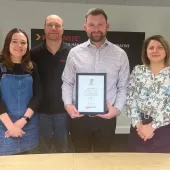FM Conway lay highest ever recycled content used in the UK
One-of-a-kind carbon-neutral Westminster road surface scheme uses 92% recycled materials
FM Conway have delivered a ground-breaking carbon-neutral scheme in Elmfield Way, Westminster, laying a new road surface containing 92% recycled materials – the highest percentage ever used on a UK road.
As Westminster City Council’s Highways partner, FM Conway delivered an upgrade of the road and footways, implementing multiple low-carbon techniques, to achieve a total embodied and operational carbon saving of 78% – equal to approximately 100 tonnes of CO2 equivalent.
The residual unavoidable carbon emissions were then offset using high-quality Verified Carbon Standard (VCS) units, administered and certified by Verra, the world’s largest carbon registry, to make it a one-of-a-kind carbon-neutral scheme.
Approximately 280 tonnes of warm-mix asphalt were laid as a single layer, covering 1,600m2 of carriageway. The proprietary mix, designed, manufactured, and laid by FM Conway, was the combination of three specifications of the contractor’s 14mm SureLayer E product with the addition of extra recycled aggregate.
The finished product provided a brand-new surface course containing 92% recycled materials, which delivered other benefits in addition to carbon reduction, such as faster installation and less neighbourhood disruption. The material’s use of a bespoke polymer-modified bitumen also meant increased durability and resilience, extending its life for years to come.
To achieve the substantial carbon savings, the asphalt material was manufactured at lower temperatures and laid in a thinner layer, meaning there were approximately 30% less tonnes manufactured, transported, and laid – saving carbon throughout the life cycle.
The use of recycled content meant less virgin bitumen and less quarried stone was used, preserving the natural environment and reducing the carbon impact from haulage of these materials. In addition, the road planings were transported back to the same plant where the asphalt was made, optimizing HGV logistics and minimizing empty journeys.
Additional carbon savings were made in the footway construction, through the implementation of FM Conway’s low-carbon model, which incorporated closed-loop recycling of excavated materials, as well as the use of lower-thickness paving materials and lower-carbon cement alternatives.
The full scope of works was carried out using no fossil fuels on site. This was achieved through the use of hydrotreated vegetable oil (HVO) in the resurfacing element of the scheme, plus the use of electric mini-excavators, disc cutters, and compaction plates, as well as using a solar powered welfare unit which used HVO as a backup in the footways element.
After the industry-leading embodied and operational carbon savings were achieved, the residual unavoidable emissions were offset using high-quality carbon removal and renewable power projects. The business has also supported tree planting in the UK, through the purchase of Pending Issuance Units administered by the Woodland Carbon Code, marking FM Conway’s investment in future UK-based carbon removals.
The completed project now joins a series of low-carbon trials delivered throughout Westminster as part of the Council and FM Conway’s shared net-zero ambitions, in which the partnership is using these new specifications to provide significant carbon savings compared with traditional materials and methods.
FM Conway and Westminster City Council have a longstanding history in pioneering the use of recycled content. A trial to lay an 80% recycled content surface in Sutherland Avenue in June 2019 was followed in 2021 by a warm-mix surface course containing 85% recycled content on Third Avenue, and this latest improvement to 92% recycled content in Elmfield Way represents a further significant improvement in sustainable materials.
FM Conway sustainability director Matt Tallon said: ‘This one-of-a-kind scheme illustrates how it is possible to stack together the best low-carbon products, methods, and techniques that are available today, to deliver massive carbon reductions. It is only once these embodied and operational carbon savings are made, should the residual carbon be offset, which in this case was done with high-quality, verified VCS carbon removal and renewable projects, as well as the planting of trees in the UK.’
Councillor Paul Dimoldenberg, cabinet member for city management and air quality, said: ‘The use of 92% recycled materials is remarkable and a huge step in the right direction as part of the council’s commitment to creating a Fairer Environment. ‘We’re not only reducing our carbon footprint, but also promoting a cleaner, greener future for Westminster. This is only the start of more carbon-saving initiatives we’ll be trialling in the city to get us one step closer to hitting our net-zero targets.’
Phil Robson, head of operations (Highways) at Westminster City Council, added: ‘As part of our wider efforts to achieve net zero, we are delighted to have worked in collaboration with FM Conway to push the boundaries of the recycled asphalt product (RAP) element of carriageway works.
‘It is a really interesting time to be working in Highways with partners and adapting services to achieve climate resilience and low zero carbon emissions. The transition requires the use of offsets at this time, but we expect to see lower reliance on them over time. A big thank you to all the excellent engineers that have worked on this project.’










